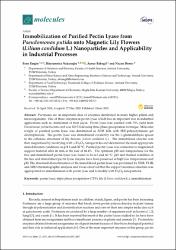| dc.contributor.author | Taşgın, Esen | |
| dc.contributor.author | Nadaroğlu, Hayrunnisa | |
| dc.contributor.author | Babagil, Aynur | |
| dc.contributor.author | Demir, Nazan | |
| dc.date.accessioned | 2020-11-20T14:39:28Z | |
| dc.date.available | 2020-11-20T14:39:28Z | |
| dc.date.issued | 2020 | |
| dc.identifier.issn | 1420-3049 | |
| dc.identifier.uri | https://doi.org/10.3390/molecules25112671 | |
| dc.identifier.uri | https://hdl.handle.net/20.500.12809/456 | |
| dc.description | WOS: 000553858800208 | en_US |
| dc.description | PubMed ID: 32526868 | en_US |
| dc.description.abstract | Pectinases are an important class of enzymes distributed in many higher plants and microorganisms. One of these enzymes is pectin lyase which has an important role in industrial applications such as clarification of fruit juices. Pectin lyase was purified with 73% yield from Pseudomonas putida bacteria and was 220.7-fold using three phase precipitation technique. Molecular weight of purified pectin lyase was determined as 32.88 kDa with SDS-polyacrylamide gel electrophoresis. The pectin lyase was immobilized covalently via the L-glutaraldehyde spacer to the cellulosic structures of lily flowers (Lilium candidum L.). The immobilized enzyme was then magnetized by modifying with gamma -Fe3O4 nanoparticles and determined the most appropriate immobilization conditions as pH 6 and 30 degrees C. Purified pectin lyase was connected to magnetized support material after 60 min at the rate of 86.4%. The optimum pH and temperatures for the free and immobilized pectin lyase was found to be 6.0 and 40 degrees C. pH and thermal stabilities of the free and immobilized pectin lyase enzyme have been preserved at high-low temperatures and pH. The structural characterization of the immobilized pectin lyase was performed by SEM, FT-IR, and XRD chromatographic analyses and it was observed that the support materials structure was appropriated to immobilization with pectin lyase and to modify with Fe3O4 nanoparticles. | en_US |
| dc.description.sponsorship | Scientific Research Projects Unit of Ataturk UniversityAtaturk University [2016/140] | en_US |
| dc.description.sponsorship | This study was supported by the Scientific Research Projects Unit of Ataturk University within the scope of the Project No 2016/140. | en_US |
| dc.item-language.iso | eng | en_US |
| dc.publisher | Mdpi | en_US |
| dc.item-rights | info:eu-repo/semantics/openAccess | en_US |
| dc.subject | Pectin Lyase | en_US |
| dc.subject | Triple Phase Precipitation (TPP) | en_US |
| dc.subject | Lily (Lilium Candidum L | en_US |
| dc.subject | Immobilization | en_US |
| dc.title | Immobilization of Purified Pectin Lyase from Pseudomonas putida onto Magnetic Lily Flowers (Lilium candidum L.) Nanoparticles and Applicability in Industrial Processes | en_US |
| dc.item-type | article | en_US |
| dc.contributor.department | MÜ, Fen Fakültesi, Kimya Bölümü | en_US |
| dc.contributor.institutionauthor | Demir, Nazan | |
| dc.identifier.doi | 10.3390/molecules25112671 | |
| dc.identifier.volume | 25 | en_US |
| dc.identifier.issue | 11 | en_US |
| dc.relation.journal | Molecules | en_US |
| dc.relation.publicationcategory | Makale - Uluslararası Hakemli Dergi - Kurum Öğretim Elemanı | en_US |


















